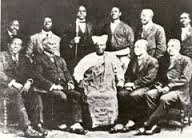The National Congress of British West Africa (NCBWA) was formed in Accra, Gold Coast (now Ghana) in 1920 by the educated elites from English-speaking West African colonies led by Mr. Joseph Casely Ephraim Hayford of Ghana and Dr. Akinwande Savage of Nigeria. The NCBWA’s first meeting was held at the Rogers (African) Club in Accra from 11th to 29th of March, 1920. It was attended by fifty-two delegates: forty-two from the Gold Coast itself; six from Nigeria; three from Sierra Leone; and one from the Gambia.
One of the major aims/demands of this body was granting elective principle in West Africa. Other aims/demands included:
* granting Africans the right of installing and deposing their rulers;
* establishing a legislative council in the four Anglophone West African colonies;
* establishing at least a University in West Africa;
* granting Africans the right to vote and be voted for.
In 1921, the congress sent a delegation to London to present a petition stating its demands to Lord Milner, the then Secretary of State for Foreign Affairs. The delegation, led by Chief Oluwa, included Mr. Herbert Macaulay, Mr. Egerton Shyngle, Dr. Akinwande Savage and Mr. Casely Haford, the president of the congress.
However, the journey to London was an exercise in futility. The members of the congress were accused of self-centeredness and were also said to have represented no one but the educated and elite class of their colonies. The colonial office also argued that West Africans were not yet ripe for representative institutions and it would amount to foolhardiness allowing them this.
In 1929, Sir Hugh Clifford, when setting up the legislative council for Nigeria, made a recommendation for elective representation which was granted by the new Secretary of State of the colonies, Winston Churchill. Nigeria then became the first colony to adopt this elective principle in British West Africa.
It must be noted that when the elective principle was granted, only those earning £100 and above which was then a large amount of money, can vote.
However, the accusation of being self-centered spelt a big doom for the NCBWA as the congress became a shadow of itself after 1930, even though it met thrice after the London tour- in 1924 in Freetown, 1926 in Bathurst and 1930 in Lagos.
Even though the National Congress for British West Africa faded away quickly, it achieved some of its aims which included:
* establishment of a legislative council in each of the colonies;
* more room for Africans in participating in their own government;
* establishment of political parties in British West African colonies, e.g, the Nigerian National Democratic Party (NNDP) formed by Herbert Macaulay in 1923
* establishment of higher institutions in West Africa, e.g. the Achimota College, Ghana; the Fourah Bay College, Sierra Leone; Yaba College, Lagos, Nigeria (1934)
References:
* C. C Dibie; The Essential Government for Senior Secondary Schools; Feb. 2003, Tonad Publishers.
* E. Ola Abiola; A Textbook of West African History; 3rd edition; Ado-Ekiti; Omolayo Standard Press & Bookshops co. (Nig.) Ltd., 1984

Which type of stupid elective principle is that? £100, back then is godamn plenty.
They should have given us anything then!
LikeLike
Let’s be thankful they did that, what if they didn’t respond at all? What can we do then?
Thanks to Joseph Casely Ephraim Hayford and Dr. Akinwande Savage.
LikeLike
I like this page
LikeLike
it was a wonderful task
LikeLike
Indeed it was. Thanks for your visit and comment, Rosemary.
LikeLike
I wish them all d best.
LikeLike
Thank you for your visit and comment, Mr. Abubakar shehu. Kindly do check back.
LikeLike
very helpful.
the references are too small.
Again, kindly let us know the author of the individual write-ups, for academic purposes
LikeLike